Sri Lanka
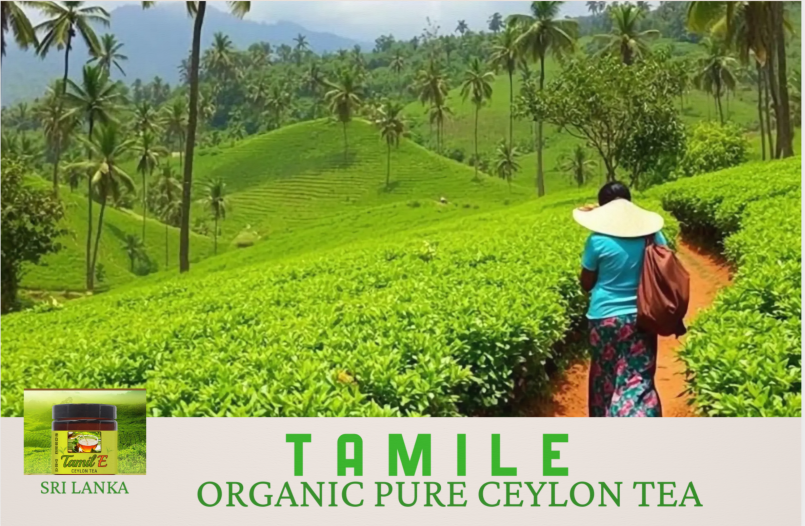
TamilE Tea have the potential to improve company operations, enhance investors’ satisfaction and Ultimately, tea working community in Srilanka.
TamilE - It's Pure Ceylon Tea
investors
Time Remaining
Tamile Tea – Sri Lanka
“Pure Ceylon Tea from Tamil Soil”
Owned by: EelamClub
1. Executive Summary
Tamile Tea is a premium tea brand under EelamClub, dedicated to producing and exporting high-quality, authentic Ceylon tea sourced exclusively from the Tamil-majority regions of Sri Lanka. Our mission is to empower Tamil farmers, revive ancestral tea traditions, and bring the world a taste of heritage from Sri Lanka.
We aim to build a global identity for Tamile Tea through ethical sourcing, community empowerment, and premium quality.
2. Vision & Mission
Vision:
To make Tamile Tea a globally recognized brand that uplifts the Tamil economy and shares the richness of Tamil culture through every cup.
Mission:
-
Source 100% Tamil-grown tea.
-
Support small-scale farmers and local women in agriculture.
-
Offer organic, handpicked, and ethically produced tea.
-
Reinvest profits into the Tamil community through EelamClub initiatives.
3. Products
Main Product Categories:
-
Premium Loose Leaf Tea
-
Black Tea (High Grown)
-
Green Tea
-
White Tea (limited edition)
-
-
Tea Bags (biodegradable packaging)
-
Flavored Teas
-
Cardamom, Ginger, Mint, Lemongrass
-
-
Cultural Specialty
-
“Kallu Katti Tea” – bold Tamil-style tea
-
“Temple Tea” – inspired by traditional temple brews
-
-
Gift Sets & Subscription Boxes
4. Market Analysis
Target Markets:
-
Tamil diaspora (USA, Canada, UK, Australia, Europe)
-
Global tea lovers seeking premium ethical products
-
Specialty stores, cafes, and ethnic markets in India and arabic nations
Market Trends:
-
Rising demand for organic and fair-trade tea
-
Consumers interested in origin-specific, story-rich products
-
Growth in e-commerce and tea subscription models
5. Unique Selling Proposition (USP)
-
Tamil-origin guarantee – All tea sourced from Sri Lanka.
-
Fair Trade & Ethical – Farmers receive above-market prices.
-
Cultural Identity – Rich storytelling, Tamil names, heritage branding.
-
Community-Based – Profits reinvested in local projects via EelamClub.
6. Branding & Packaging
-
Earth-tone colors, palm-leaf motifs, and Tamil script on packaging
-
QR codes that tell the story of the farmer/farm
-
Eco-friendly, recyclable materials
-
Multilingual labeling (Tamil, English, French)
7. Operations & Supply Chain
-
Partner with existing Tamil-owned tea estates and cooperatives
-
Work with agricultural experts to train and certify farmers (organic)
-
Processing unit setup in kandy
-
Packaging unit for local employment (especially women-led)
8. Sales & Marketing Strategy
-
Online store – Tamilum.com
-
Amazon & Etsy presence
-
Social Media – Instagram reels, TikTok tea ceremonies, Tamil culture themes
-
YouTube Ads – “Every Sip Supports Tamil Land”
-
Retail Distribution – South Asian stores in diaspora regions
-
Pop-up stalls – at Tamil festivals, temples, and community events
9. Financial Plan
🌍 Global Tea Market Capital / Size
🔹 Global Tea Market
-
Estimated value in 2025: $270–300 billion USD
-
CAGR (Growth Rate): 5%–6% annually
-
Specialty and organic teas growing faster than general tea market
🔹 Ceylon (Sri Lankan) Tea Market
-
Export revenue (2024): ~$1.3 billion USD
-
Sri Lanka exports ~250 million kg of tea annually
-
Main buyers: Russia, Middle East, Europe, USA, and Japan
🇱🇰 Tamil Region Market Share Potential
❗Current Situation:
-
Most Sri Lankan tea is grown in the Central Highlands (Kandy, Nuwara Eliya)
-
Tamil-majority North and East contribute less than 5% of total Ceylon tea exports today
✅ Tamile Tea Opportunity:
-
Carve a new niche: Tamil-grown, ethically produced, cultural tea
-
Potential market value:
-
Diaspora niche (1–5 million Tamils worldwide): $10M–$50M+
-
Premium ethical/organic tea consumers globally: multi-billion segment
-
💰 Tamile Tea Brand – Potential Market Capitalization
If Tamile Tea scales well with branding, export, and direct-to-consumer:
| Year | Target Revenue | Estimated Valuation (3x Revenue) |
|---|---|---|
| Year 1 | $100K–$250K | $300K–$750K |
| Year 3 | $1M–$2M | $3M–$6M |
| Year 5 | $5M+ | $15M+ |
Startup Costs and capital:
-
Equipment: $30,000
-
Packaging & Branding: $15,000
-
Website & E-commerce setup: $5,000
-
First batch procurement: $10,000
-
Market capital: $200000
Total: ~$268,000
(Crowdfunded via EelamClub and investors)
Revenue Streams:
-
Online tea sales
-
Monthly subscription boxes
-
B2B bulk sales
-
Gift boxes for festivals
10. Social Impact Goals
-
Create 100+ jobs in Tamil regions in 3 years
-
Provide scholarships for children of farmers
-
Launch women-led co-ops for packaging and herbs
It's a Ceylon Tea.The best Tea in the World.
இது EelamClub நிறுவனத்தின் ஓர் அங்கம்.
கடந்த 150 ஆண்டுகளாக நம் தமிழ் உறவுகள் இலங்கையின் தேயிலைத்தோட்டத்தில் பல்வேறு முதலாளிகளுக்கும் அடிமைகளாக தம் உழைப்பை மட்டும் கொடுப்பதற்காகவே வாழ்ந்து வருகின்றனர். இலங்கைப்பூர்வீகத் தமிழரும் சிங்களத்தின் சாணக்கியத்தில் அறிவிழந்து மலையகத்தமிழரைப் புறக்கணித்தனர். இன்நிலை 1980 வரை நீடித்தது. பின்னாளில் இலங்கையின் அரசியல்களம் மாறிப்போனது.ஆனாலும் மலையகத்தமிழரின் வாழ்க்கையில் நல்லதே நடக்கவில்லை.
நாம் இன்று தமிழி தேயிலை நிறுவனத்தை ஆரம்பித்துள்ளோம்.இது ஆரம்பிக்கப்பட்டதன் நோக்கமே நம் மலையக தமிழ் உறவுகளுக்காகவே.
நமது தமிழி தேயிலை மூலமாக கிடைக்கும் நிகர வருவாயில் 10% இலாபத்தை மலையக தோட்டத்தொழிலாளருக்கு நேரடியாகக்கொடுப்பது என்ற ஒரே நோக்கோடு ஆரம்பித்துள்ளோம்.
உலகெங்கும் 13 கோடித்தமிழர் காலையும் மாலையும் தேநீரில் வாழ்ந்தாலும் ஏன் தேயிலைத்தோட்டத்து நம் உறவுகளின் வாழ்வு செழிக்கவில்லை.
தேயிலை வியாபாரத்தில் அன்னியநிறுவனங்களே இலங்கையிலும் இந்தியாவிலும் உள்ளதாலும் தமிழர் வெறும் நுகர்வோராகவே இருப்பதாலும் அடிமைத்தனமும் அறியாமையும் தொடர்கிறது.
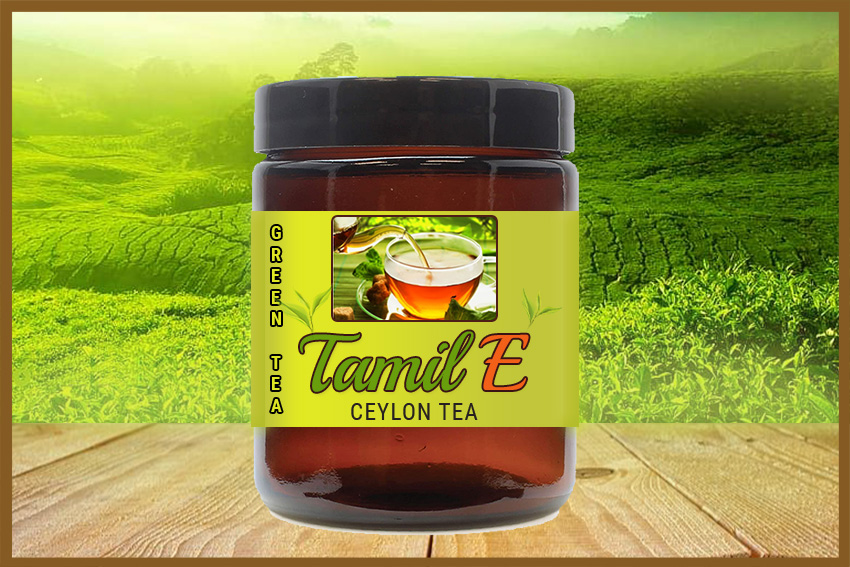
கீழே சில இலங்கையில் உள்ள தேயிலை நிறுவனங்கள்:
- Lipton - UK
- Tetley -Tata kolkata
- Twinigs - UK
- Dilmah - Srilankan sinhalies
- Bushells and Liton -Australia
- Madame -Australia
- T2 -Australia
- Akbar -UAE based in Srilanka
- Alghazaleen Tea -Amman
- Heladiv -Dutch
- Steuarts tea -UK
- Mlesna Tea -Euro and more
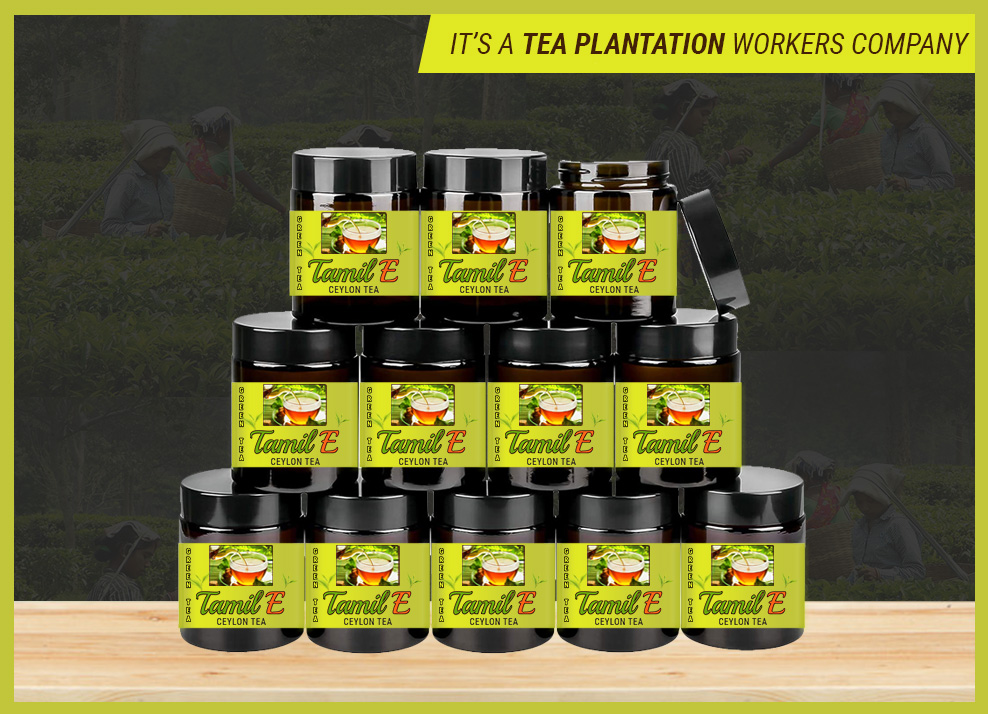
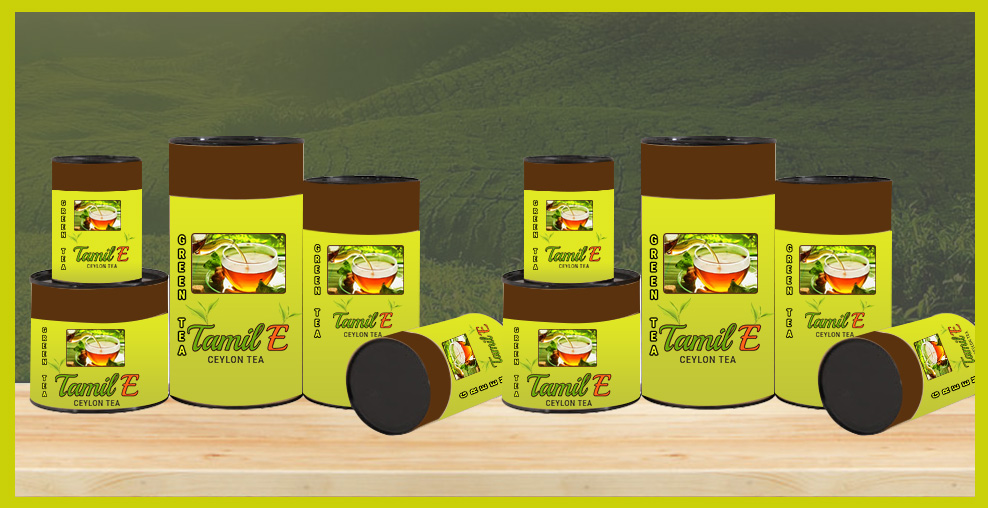
நாம் தமிழராக இணைந்து குறைந்தது நம் தமிழ்ச்சமூகத்திற்கு தேவையான தேயிலையின் தேவையின் 1% பயன் படுத்த தொடங்கினாலும் தோட்டத்தொழிலாளரும் தமிழி நிறுவனமும் நலன்பெறும்.
நாம் தேயிலையின் தரத்தில் எந்தவிதத்திலும் சமரசம் செய்யவில்லை.இலங்கையில் கிடைக்கும் மிகமிகத் தரமான தேயிலையை நமது தமிழியும் தயாரிக்கின்றது.
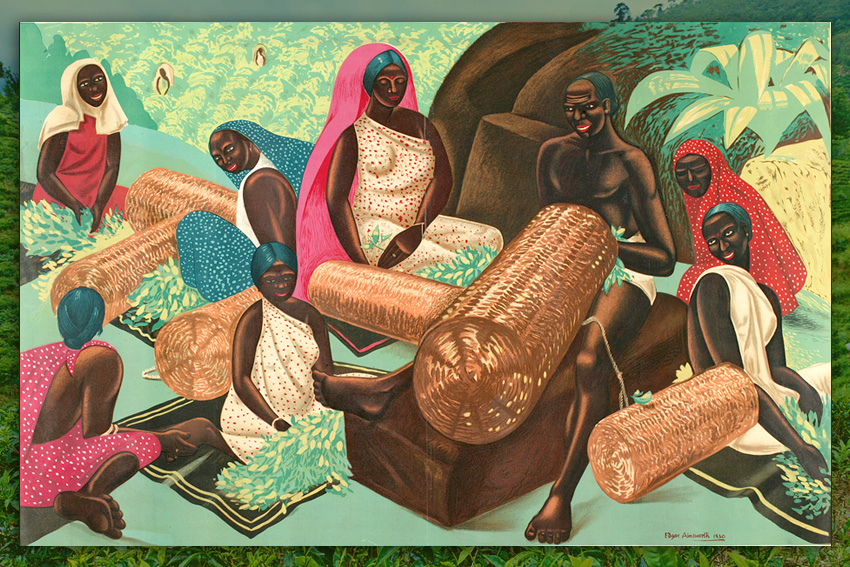
In today's challenging economic times in the world, but my Tamil peoples are challenging economics, political, social discrimination and living environments issues last 150 years. Still today nothings get better than before. There is an increasing awareness in the world Tamil community after 2009.
We all stand to benefit from working in partnership. Through community-management partnerships, historically adversarial workplace relationships are transformed into collaborative relationships. Tamil A tea have the potential to improve company operations, enhance investors’ satisfaction and Ultimately, tea working community in Srilanka.

Highlights
- Tamil E Ceylon tea is also linked to health benefits like improved heart health and blood sugar control, as well as weight loss.
- January-June 2020 cumulative production and use of totaled 129.0 million kgs, recording a decrease of 29.8 million kgs against the volume of 158.8 million kgs in January-June 2019 in Srilanka.
- Expected gross margin of 62% on sales in 3 years.
- Partnership with Whole Foods, available online and on Amazon And 130 million Tamils are living all over the world and every one having tea every morning and minimum twice a day.
- It’s one of the fewer Tamils own Tea company.
- Retailing at 80 country+ stores.
10% profits for Tea workers community in Srilanka
Entrepreneur set out to create Sri Lanka’s first completely handmade, organic tea plantation. Whether or not they succeeded in making a profit, they pledged 10 per cent of all the revenue would go to Tea plantation worker community.

A bitter brew: For Sri Lanka's tea estate workers, fair wage is still elusive. “For three years now, Sri Lanka's tea estate workers have been agitating for a daily basic wage of LKR 1,000.” A tea estate worker in the Dambatenne tea plantation in Haputale, Uva Province.

Often described as the backbone of the economy, close to 1.5 lakh tea estate workers have been agitating for fair wages for the last three years. Ahead of Sri Lanka’s presidential election in November, which the laborers see as another season of empty promises, Meera Srinivasan reports on how they view their struggle
“Half the blood in our bodies is sucked by these leeches. Can’t someone find some medicine to keep them away?” At first it is hard to locate the voice that is emerging from the bushes. A few feet off the road margin, at a slightly higher elevation is a worker, with her head alone visible over the lush green leaves. “They get all over us even if we smear a packet of salt,” the worker says, as she continues to pick leaves at an estate near Hatton in Nuwara Eliya district of the Central Province in Sri Lanka.
“What she says is very true. I was hospitalized because of this,” says B. Devika, another worker, pointing to the many scars on her feet ravaged by hungry parasites. “It is so painful even now,” says the 36-year-old mother of two.
Leeches are only part of the problem for hundreds of women like them who work in the tea estates located in the hill country. The women’s hands move rapidly, as if in circles, picking tender tea leaves from the top of bushes. In a matter of seconds, as their palms brim with leaves, they reach out to the bags hanging from their shoulders and empty the leaves into them — a recurring action whose rhythm they have mastered, knowing well that their labour and speed is money, even though the money is far from fair. After a prolonged struggle for fair wages, the workers who sustain Sri Lanka’s economy are tired.
An elusive fair wage
For three years now, Sri Lanka’s tea estate workers have been agitating for a daily basic wage of LKR 1,000, which they think is reasonable compensation for their backbreaking work of picking 16-18 kgs of tea leaves a day over eight hours. While their labor remains largely invisible, its outcome, the famous, flavorful Ceylon tea, has, for decades, brought Sri Lanka global recognition and valuable foreign exchange — over $1.4 billion according to official data for 2018. About 1.5 lakh people from the million-strong community are engaged in direct labor in the estates.
Frustrated with their stagnant wages and spiralling living costs, tens of thousands of workers joined the ‘1,000-rupee wage’ struggle, one of Sri Lanka’s biggest worker mobilisations in recent history, both in its show of strength and geographic spread, in plantations across the island’s Central, Uva and Southern Provinces.
On October 24, 2018, their protests – which began nearly two years earlier – culminated in a massive demonstration at Galle Face Green, Colombo’s iconic sea-front promenade. Thousands of Malayaha (hill country) Tamils now living in Colombo, and others in solidarity, mobilised largely through a social media campaign. Wearing black they raised slogans against the ongoing exploitation of their community.
This exploitation began two centuries ago, when the British brought down labourers from south India, mainly Tamil Nadu, to work in the plantations. Post-colonial Sri Lanka proved it was not too different in its treatment of the Malayaha Tamils – disenfranchising them and even rendering them stateless. The community has had to constantly fight back to be visible and counted — for citizenship until 2003, for land and housing rights, and for a decent wage in the last few years. While their labour gave the tea workers their identity, it is their resistance that has won them even basic rights incrementally, though not adequately.
A bitter brew: For Sri Lanka’s tea estate workers, fair wage is still elusive
In January this year, trade unions and employers signed a new collective agreement, approving a 40% raise, to LKR 700 (roughly ₹275), still LKR 300 short of the amount the workers had emphatically demanded. The government later promised an additional LKR 50 to the basic wage, which workers are yet to receive.
The many rounds of unsatisfactory negotiations and numerous promises that politicians have made have left workers with one conclusion on their struggle — it was “a failure”. “What else do you call something that didn’t lead to our desired outcome?” asks Devika. “It made us realise that there was no point in trusting any trade union leader or political party any longer. Ultimately, they side with the employers.”
The agitations have stopped in the plantations, though small groups of sympathizers in Colombo continue to hold sporadic demonstrations, still demanding LKR 1,000.
Aside from being rich in antioxidants, Ceylon tea is also linked to health benefits like improved heart health and blood sugar control, as well as weight loss. It's also easy to make at home and has a unique, one-of-a-kind taste that sets it apart from other teas.
How to Make It
Brewing a cup of Ceylon TAMIL A tea at home is an easy and delicious way to enjoy the health benefits of this beverage.
Start by filling both a filtered teapot and the cups you plan on using halfway with hot water to preheat them, which helps slow down the cooling of the tea.
Next, dump out the water and add your choice of Ceylon tea leaves to the teapot.
It’s generally recommended to use about 1 teaspoon (2.5 grams) of tea leaves per 8 ounces (237 ml) of water.
Fill the teapot with water that’s around 194–205ºF (90–96ºC) and cover with the lid.




Finally, allow the tea leaves too steep for approximately three minutes before pouring into cups and serving.

Keep in mind that allowing the tea leaves too steep for longer increases both the caffeine content and flavor — so feel free to adjust according to your personal preferences.
MAJOR IMPORTERS OF SRI LANKA TEA - JANUARY/JUNE 2020

COUNTRY
| COUNTRY | 2020 | 2019 |
|---|---|---|
| IRAQ | 16,235 | 19,662 |
| TURKEY | 15,782 | 18,117 |
| RUSSIA | 14,440 | 14,972 |
| IRAN | 8,950 | 10,380 |
| AZERBAIJAN | 5,333 | 5,506 |
| CHINA | 5,099 | 6,078 |
| CHILE | 4,603 | 2,514 |
| SYRIA | 3,573 | 4,947 |
| SAUDI ARABIA | 3,438 | 3,104 |
| U.A.E | 3,318 | 4,725 |



How to Make the Perfect Cup of Tamil A Tea
Black Tea
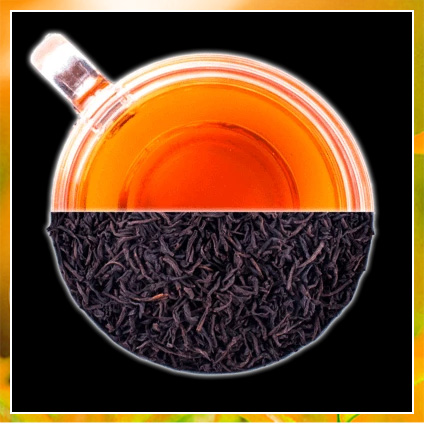
The main difference between black, green and white tea is oxidisation. As tea leaves oxidise – a natural process that occurs after they’ve been picked – they darken in colour and change flavour. Black tea is dried, oxidised (and sometimes fermented), then crushed.
| Brew temperature | 90-98°C |
|---|---|
| Brew Time | At least 3 minutes. More time will bring out more tannin flavour. |
| Flavour Profile | Robust and earthy, with heavy tannins |
| Caffeine | 60-90mg per 250ml (an espresso has about 30-50mg in just 30ml). |
Our most loved Green & White teas
Green Tea
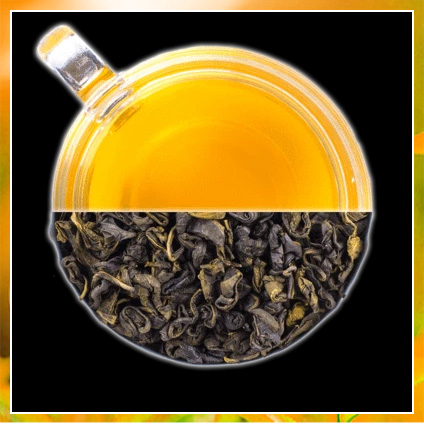
After the leaves are picked, they’re either steamed (Japanese-style) or wok-fried (Chinese-style) to prevent the oxidization process.
| Brew temperature | 70-80°C |
|---|---|
| Brew Time | 1 to 3 minutes |
| Flavour Profile | Vegetal, grassy and smoky. |
| Caffeine | 35-70mg per 250ml |
Ceylon White tea is good for the heart
White tea helps in preventing blood clots from forming in your arteries. This is helpful to prevent strokes. Along with this, the anti-oxidants present in white tea are good for the heart and promotes overall strength.
The two main causes of heart attacks are bad cholesterol and low blood pressure. White tea helps in preventing and managing both of these symptoms.
Drinking white tea regularly along with an overall healthy diet and physical exercise will ensure good health for your heart.
Ceylon White tea helps in weight loss
Polyphenols present in white tea improve overall digestion and increase the rate of your metabolism.
It also reduces the risk of indigestion and acid reflux. Having white tea regularly gets your stomach to process foods faster and getting rid of waste products faster.
Along with a healthy diet and physical exercise, Ceylon white tea helps in burning the fat much faster. Not only that, but it also helps in preventing the absorption and accumulation of fat in the body.
White Tea

The simplest and most delicate tea. The leaves are dried and crushed, without any oxidization or extra processing. Typically, new growth bulbs are picked for white tea. As only a small amount can be collected from each plantation, it’s the most expensive tea.
| Brew temperature | 70-80°C (a higher temperature will yield a stronger flavor, but also more astringency) |
|---|---|
| Brew Time | Up to 1 minute. (The shorter brew time is ideal for smoother, more delicate flavors.) |
| Flavour Profile | Gentle and floral. To use wine-speak, tones of cucumber and melon. |
| Caffeine | 35-70mg per 250ml. |
Our investors



No Discussions
FeedBack
Login to CommentFrequently asked questions
No FAQs
Investment documents
View and download documents for the Behoof Investment.No Documents
The documents have been put together in collaboration.If you have any feedback on the documents, please send it to research@eelamclub.com. The documents will be reviewed regularly to ensure they remain useful and relevant to the market.